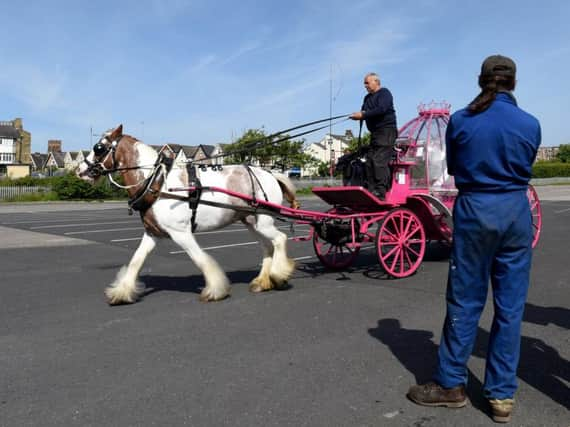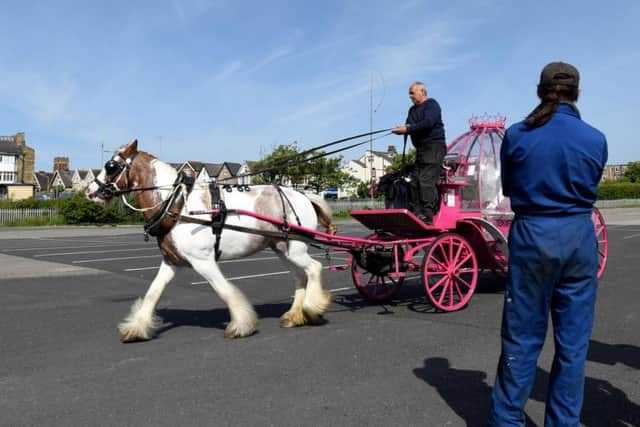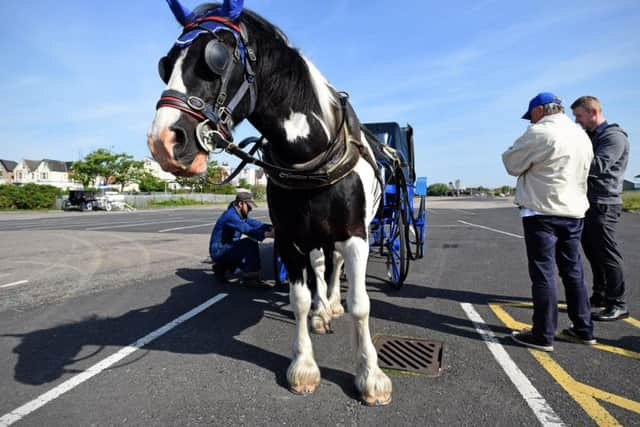Blackpool's landau fleet is put through its paces


All the resort's famous horse-drawn carriages must pass MoT-style examinations while the horses are checked over by vets before operators can be licensed to work on the Promenade for another year.
Master wheelwright Phill Gregson examined the carriages on behalf of the council at Blackpool South car park.
Advertisement
Hide AdAdvertisement
Hide AdBlackpool Council licensing officer Ryan Ratcliffe said: "They all passed the inspection bar one which didn’t attend the inspection, however there were some mitigating circumstances and it will be tested at a later date.


"A few had to come back with a few bits and pieces that had to be rectified, but apart from that it all went smoothly."
The fleet is made up of 24 Cinderella-style carriages and 20 traditional carriages.
Colin Nicholls, who operates a Cinderella landau, said : "The inspections are important and are similar to having an MoT done for your car.
Advertisement
Hide AdAdvertisement
Hide Ad"The inspector looks at things like the axels and makes sure the hood is intact and also checks the harness fittings for the horse.


"All the horses are micro-chipped and checked over by the council's vet. As well as the annual inspection, they carry out spot checks.
"We're more than happy with this and it keeps us on our toes. We all help each other out and everyone is now looking forward to the season."
Conditions of the licence include that horses cannot work for more than seven hours a day which includes an hour's break.
Advertisement
Hide AdAdvertisement
Hide AdThe animals are all micro-chipped so inspectors can check each horse is only working its permitted hours.
All carriages must be fitted with a dung catcher when they are on the public highways to prevent manure spilling onto roads.
Conditions of the licence are:
All horses must have been examined by a vet in the previous 12 months and issued with a certificate of fitness approved by the council.
Vets papers relating to the horse in harness should be available for inspection on request by an authorised officer.
Advertisement
Hide AdAdvertisement
Hide AdA horse which is harnessed to or used in connection with a licensed hackney carriage shall not be used for more than seven hours of work in any one day.
If in harness for seven consecutive hours, the horse shall during that period have a break of not less than one hour and shall be fed and watered.
No horse shall be harnessed to or used in connection with the licensed vehicle unless it is fitted with an identifying microchip, the number of which has been notified to the licensing service.
All carriages must be fitted with a dung catching device while the carriage is in use on any public highway.
Advertisement
Hide AdAdvertisement
Hide AdLights and signals (where so directed) should be fitted to the carriage at all times and should be capable of being lit by the driver.
The table of council-approved fares must be displayed in the carriage.
When carrying fare-paying passengers, only the licensed driver is allowed to accompany them.